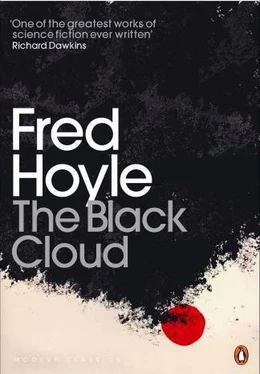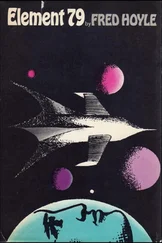Fred Hoyle - The Black Cloud
Здесь есть возможность читать онлайн «Fred Hoyle - The Black Cloud» весь текст электронной книги совершенно бесплатно (целиком полную версию без сокращений). В некоторых случаях можно слушать аудио, скачать через торрент в формате fb2 и присутствует краткое содержание. Жанр: Фантастика и фэнтези, на английском языке. Описание произведения, (предисловие) а так же отзывы посетителей доступны на портале библиотеки ЛибКат.
- Название:The Black Cloud
- Автор:
- Жанр:
- Год:неизвестен
- ISBN:нет данных
- Рейтинг книги:5 / 5. Голосов: 1
-
Избранное:Добавить в избранное
- Отзывы:
-
Ваша оценка:
- 100
- 1
- 2
- 3
- 4
- 5
The Black Cloud: краткое содержание, описание и аннотация
Предлагаем к чтению аннотацию, описание, краткое содержание или предисловие (зависит от того, что написал сам автор книги «The Black Cloud»). Если вы не нашли необходимую информацию о книге — напишите в комментариях, мы постараемся отыскать её.
The Black Cloud — читать онлайн бесплатно полную книгу (весь текст) целиком
Ниже представлен текст книги, разбитый по страницам. Система сохранения места последней прочитанной страницы, позволяет с удобством читать онлайн бесплатно книгу «The Black Cloud», без необходимости каждый раз заново искать на чём Вы остановились. Поставьте закладку, и сможете в любой момент перейти на страницу, на которой закончили чтение.
Интервал:
Закладка:
“How on earth did you come on such an idea, Chris?”
“Well, it’s pretty obvious really. The trouble is that we’re all inhibited against such thinking. The idea that the Earth is the only possible abode of life runs pretty deep in spite of all the science fiction and kids’ comics. If we had been able to look at the business with an impartial eye we should have spotted it long ago. Right from the first, things have gone wrong and they’ve gone wrong according to a systematic sort of pattern. Once I overcame the psychological block, I saw all the difficulties could be removed by one simple and entirely plausible step. One by one the bits of the puzzle fitted into place. I think Alexandrov probably had the same idea, only his English is a bit on the terse side.”
“On the bloody terse side, you mean. But seriously, do you think this communication business will work?”
“I very much hope so. It’s quite crucial that it should.”
“Why do you say that?”
“Think of the disasters the Earth has suffered so far, without the Cloud taking any purposive steps against us. A bit of reflection from its surface nearly roasted us. A short obscuration of the Sun nearly froze us. If the merest tiny fraction of the energy controlled by the Cloud should be directed against us we should be wiped out, every plant and animal.”
“But why should that happen?”
“How can one tell? Do you think of the tiny beetle or the ant that you crush under your foot on an afternoon’s walk? One of those gas bullets that hit the Moon three months ago would finish us. Sooner or later the Cloud will probably let fly with some more of ’em. Or we might be electrocuted in some monstrous discharge.”
“Could the Cloud really do that?”
“Easily. The energy that it controls is simply enormous. If we can get some sort of a message across, then perhaps the Cloud will take the trouble to avoid crushing us under its foot.”
“But why should it bother?”
“Well, if a beetle were to say to you, “Please, Miss Halsey, will you avoid treading here, otherwise I shall be crushed,” wouldn’t you be willing to move your foot a trifle?”
Communication Established
Four days later after thirty-three hours of transmission from Nortonstowe the first communication from the Cloud came through. It would be idle to attempt to describe the prevailing excitement. Suffice it to say that frenzied attempts were made to decode the incoming message, for message it obviously was, judging from regular patterns that could be discovered among the rapid pulses of radio signal. The attempts were not successful. Nor was this surprising, for, as Kingsley remarked, it can be difficult enough to discover a code when the message has initially been thought out in a known language. Here the language of the Cloud was entirely unknown.
“That seems good sense to me,” remarked Leicester. “Our problem isn’t likely to be any easier than the Cloud’s problem, and the Cloud won’t understand our messages until it’s discovered the English language.”
“The problem’s probably a great deal worse than that,” said Kingsley. “We’ve every reason to believe that the Cloud is more intelligent than we are, so its language — whatever it may be — is likely to be a lot more complicated than ours. My proposal is that we stop bothering trying to decipher the messages we’ve been receiving. Instead I propose we rely on the Cloud being able to decipher our messages. Then when it’s learned our language it can reply in our own code.”
“Dam’ good idea. Always force foreigner to learn English,” said Alexandrov to Yvette Hedelfort.
“To begin with, I think we should stick as much as possible to science and mathematics because these are likely to be the best common denominator. Later on we can try sociological stuff. The big job will be to record all the material we want to transmit.”
“You mean that we ought to transmit a sort of basic course in science and mathematics, and in basic English?’ said Weichart.
“That’s the idea. And I think we ought to get down to it right away.”
The policy was successful, too successful. Within two days the first intelligible reply was received. It read:
“Message received. Information slight. Send more.”
For the next week almost everyone was kept busy reading from suitably chosen books. The readings were recorded and then transmitted. But always there came short replies demanding more information, and still more information.
Marlowe said to Kingsley:
“It’s no good, Chris, we shall have to think up a new idea. This brute’ll soon exhaust the lot of us. My voice is getting as hoarse as an old crow with this constant reading.”
“Harry Leicester’s working on a new idea.”
“I’m glad of that. What is it?”
“Well, it may kill two birds with one stone. The slowness of our present methods isn’t the only trouble. Another difficulty is that a great deal of what we’re sending must seem shockingly unintelligible. A whole multitude of words in our language refer to objects that we see and touch and hear. Unless the Cloud knows what those objects are I don’t see how it can make sense of a great deal of the stuff we’re churning out. If you haven’t ever seen an orange or come in contact with an orange in some way, I don’t see how you could possibly know what the word “orange” means, however intelligent you were.”
“I can see that. What d’you propose to do?”
“It was Harry’s idea. He thinks he can use a television camera. Luckily I got Parkinson to lay some in. Harry thinks he can hook one up to our transmitter, and what’s more he’s pretty confident that he can modify it to do something like 20,000 lines instead of the miserable 450 or so lines of ordinary television.”
“That’s because of the much lower wave-length?”
“Yes, of course. We ought to be able to transmit an excellent picture.”
“But the Cloud doesn’t have a television tube!”
“Of course not. How the Cloud decides to analyse our signals is entirely its own business. What we must make sure of is that we’re transmitting all relevant information. So far, we’ve been doing a pretty poor job and the Cloud’s been quite right to complain.”
“How do you propose to use the television camera?”
“We’ll start by going through a whole list of words, demonstrating various nouns and verbs. This will be preliminary. It’s got to be carefully done but it shouldn’t take too long to go through about five thousand words — perhaps a week. Then we can transmit the contents of whole books by scanning the pages with the camera. It should be possible to deal with the whole Encyclopaedia Britannica in a few days by this method.”
“That certainly ought to satisfy the brute’s thirst for knowledge. Well, I suppose I’d better get back to my reading! Tell me when the camera’s going to be ready. I can’t estimate how glad I’ll be to get rid of this chore.”
Later Kingsley could be seen in contact with Leicester. “I’m sorry, Harry,” he said, “but I’ve got some other problems.”
“Then I hope you’ll keep them to yourself. We’re right under the surface here in this department.”
“I’m sorry but they concern you, and I’m afraid they’ll mean more work.”
“Look here, Chris, why don’t you take your coat off and start doing some real work instead of interrupting the good intentions of the proletariat? Well, what’s the trouble? Let’s hear it.”
“The trouble is we’re not giving enough attention to the receiving end, to us here as the receiving end, I mean. Once we start to transmit with the television camera we shall presumably get replies in the same form as we transmit. That’s to say a received message would appear as words on a television tube.”
Читать дальшеИнтервал:
Закладка:
Похожие книги на «The Black Cloud»
Представляем Вашему вниманию похожие книги на «The Black Cloud» списком для выбора. Мы отобрали схожую по названию и смыслу литературу в надежде предоставить читателям больше вариантов отыскать новые, интересные, ещё непрочитанные произведения.
Обсуждение, отзывы о книге «The Black Cloud» и просто собственные мнения читателей. Оставьте ваши комментарии, напишите, что Вы думаете о произведении, его смысле или главных героях. Укажите что конкретно понравилось, а что нет, и почему Вы так считаете.












